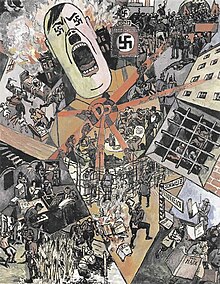

Adolf Hitler, dictator of Germany from 1933 to 1945, has been represented in popular culture ever since he became a well-known politician in Germany. His distinctive image was often parodied by his opponents. Parodies became much more prominent outside Germany during his period in power. Since the end of World War II representations of Hitler, both serious and satirical, have continued to be prominent in popular culture, sometimes generating significant controversy.[1][2] In many periodicals, books, and movies, Hitler and Nazism fulfill the role of archetypal evil.[3][4] This treatment is not confined to fiction but is widespread amongst nonfiction writers who have discussed him in this vein.[5][6][7][8] Hitler has retained a fascination from other perspectives; among many comparable examples is an exhibition at the German Historical Museum which was widely attended.[9]
- ^ Cocks, Geoffrey (Autumn 1979). "The Hitler Controversy". Political Psychology. 1 (2). International Society of Political Psychology: 67–81. doi:10.2307/3791103. JSTOR 3791103.
- ^ "Israel wants Indian menswear shop Hitler renamed". CBS News. September 3, 2012. Retrieved 19 October 2014.
- ^ "An attempt to fathom Hitler / Robert Carlyle conveys depths of tyrant's evil". San Francisco Chronicle. May 16, 2003. Retrieved 19 October 2014.
- ^ Erickson, Hal (2014). "Hitler: The Rise of Evil (2003): Movie review". Movies & TV Dept. The New York Times. Archived from the original on 27 October 2014. Retrieved 19 October 2014.
- ^ Victor, G. (1999). Hitler: The Pathology of Evil. Potomac Books. ISBN 1-57488-228-7.
- ^ Rosenbaum, R. (1999). Explaining Hitler: The Search for the Origins of His Evil. Harper Perennial. ISBN 0-06-095339-X.
- ^ Johnson, E. (2000). Nazi Terror: The Gestapo, Jews, and Ordinary Germans. Basic Books. ISBN 0-465-04908-7.
- ^ Levenda, P. (2005). Unholy Alliance: A History of Nazi Involvement with the Occult. Continuum. ISBN 0-8264-1409-5.
- ^ A. J. Goldman (3 November 2010). "Why Did Germans Embrace Him?". The Wall Street Journal. Retrieved 20 October 2014.
Nazis are never far from the news here, but 'Hitler and the Germans: Nation and Crimes' is Hitler's biggest coup in Berlin since Mel Brooks's 'The Producers' lit up the German capital last year. The exhibition at the German Historical Museum has attracted a mountain of domestic and international media attention and brisk business.